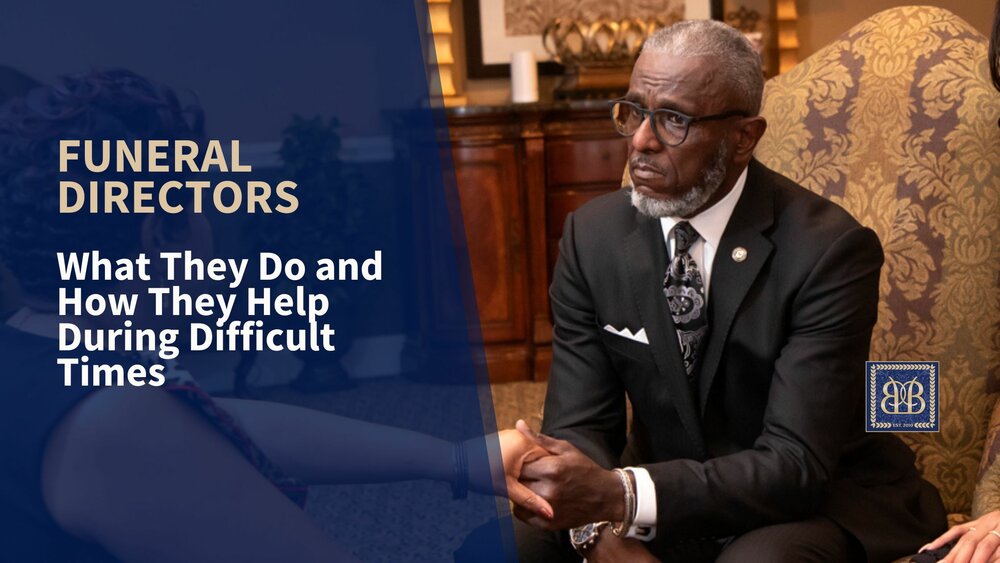Funeral Directors: What They Do and How They Help During Difficult Times
Most of us are unaware of the invaluable services funeral directors provide, bridging the gap between sorrow and healing.
The role of the funeral director may seem simple, but its complex and multi-faceted. They assume a broad range of responsibilities to ensure that final farewells are always carried out with the utmost compassion, dignity, and professionalism.
In this article, we will examine the essential role funeral directors play and outline the many ways they provide support during life’s most challenging moments.
What should you expect from your funeral director?
Funeral directors have a wealth of knowledge that extends from pre-planning to orchestrating the details of the arrangements to providing support when it’s needed the most. These professionals offer supportive guidance that families can rely on 24 hours a day. They are highly experienced in their field, enabling them to comfortably accommodate a range of client wishes for their departed loved ones.
What are their primary functions?
Planning and organizing
Funeral directors are central to arranging and coordinating every facet of the funeral or memorial service. When notified that a death has occurred, they immediately get to work. They make the necessary arrangements for the transportation of the deceased, preparing the body for burial or cremation, and ensuring the family’s wishes are met throughout every aspect of the end-of-life process.
Offering compassionate care
A key part of a funeral director’s role is to provide compassionate support and guidance to the bereaved. From initial meetings to discuss preferences for the service, to providing emotional support and resources for coping with grief, funeral directors are there to listen, help in any way possible, and offer a comforting shoulder during an emotional time.
Respecting religious and cultural practices
Funeral directors are well-versed in the many religious and cultural practices that exist related to death and burial. They work closely with families to ensure that the funeral service respects the departed’s traditions and beliefs, whether that means organizing an extended visitation, coordinating the repast, or ensuring all required rituals and rites are observed.
Handling legal requirements
When a person passes on, a barrage of paperwork and legal documents must be attended to. Funeral directors acquire the appropriate permits and death certificates, assist with insurance claims, and complete required forms and documentation. This can provide significant relief to the bereaved, who may find such tasks overwhelming.
Performing public outreach
Most people don’t think about it, but funeral directors have a role in educating the public about end-of-life services and the options available to families during a difficult time. They provide crucial information about various types of funerals, cremation choices, and the legal requirements involved in handling a loved one's affairs. They often take part in community programs, speaking about grief, bereavement, and the importance of planning for end-of-life decisions.
Facilitating the service
At the funeral or memorial service, funeral directors are once again the central figure. They oversee the many aspects pf the event, coordinating with clergy, musicians, and other service providers. In many cases, they even facilitate the ceremony itself, particularly if the service is held at the funeral home. In addition, they manage logistics like setting up the venue, receiving floral tributes, and arranging transportation for the family.
Assisting with aftercare
When the funeral is over, the funeral director’s role continues. They often provide aftercare services or grief counseling resources. They also help families tend to the many practicalities that come after a loved one’s passing, such as dealing with their belongings and notifying various agencies of the death.
The role of a funeral director is complex, requiring a delicate balance of practicalities and emotional support. They provide invaluable service to families in their time of need, ensuring that every aspect of their loved one’s final farewell goes smoothly and is carried out with dignity.
Batchelor Brothers Funeral Services is committed to providing comprehensive and compassionate services to those who are coping with loss. Funeral directors are a vital part of our team, ensuring that you and your loved ones are cared for throughout the funeral process. Please contact us if we can assist you in any way.
About Batchelor Brothers Funeral Services: As a leading African American-owned and operated funeral and cremation organization, Batchelor Brothers Funeral Services has provided a ministry of care to thousands of grieving families. We promise to provide our highest level of distinguished service and respect to families who entrust us to honor their loved ones. With two convenient locations serving North and West Philadelphia, it is always our pleasure to be of service. For more information about our funeral, cremation, memorial, repast, and grief counseling services, please visit batchelorbrothers.com.







Comments